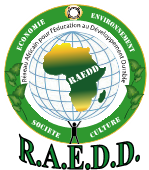The Logpom2 secondary school at training for sustainable development and the climate emergency.
RAEDD is a Cameroonian association that works for the promotion and popularization of ESD through capacity building of teachers

Overview of the project
It is a multisectoral initiative aimed at aligning this school with the requirements of sustainable development and its education; it begins with the declaration of sustainability, which is a written act attesting that the school is committed to sustainable development. This is followed by capacity building for teachers who do not always know what sustainable development is, let alone how to educate them. The setting up of a committee for the follow-up and monitoring of the project, made up of the head teacher, teachers and students, some of whom are members of the environmental police. The capacity building sessions for the teachers take place at the same time as the students are discussed on the themes of sustainable development and are sanctioned by the training in the making of compost and ecological coal.
The eco-cantine employees are trained in health security within the school during these times of pandemic. The initiative mobilizes the entire school of over 3500 students. The ecojogging is practiced once a week to raise awareness on the “clean school and green spaces”, expressions that are part of the message of the Ministry of Secondary Education of the country. Not to mention the minute of sustainable development that takes place every Monday during the ceremony of raising the colors. This is how the initiative is being carried out, which in the long run should allow the school to be included in the UNESCO network of sustainable schools.
The major objective is to equip learners with skills to become environmental and climate advocates.
Ongoing research
On 10/15/2019, project interrupted by covid19 trigger.
1-The number of students and teachers reached is 3650.
2-The students being multipliers, they carry this message home and the parents are affected.
3-The other schools, in the reproducibility, are touched.
1-The teachers know what SD and its education are.
2-They teach their subjects with an eye to the facts.
3-The school becomes plastic free.
2-Students are part of the fight against climate change, they are very often forgotten.
3-Students learn skills in composting and charcoal making.
4-Students can take the initiative to found a micro-project of compost and bio-charcoal making and get involved in the circular economy.
It was funded by the recipient school to the tune of $2500.
organisation
This association is mainly composed of secondary and primary school teachers. It works for the promotion and popularization of SDG through capacity building of teachers. Thus, the latter teach their subjects taking into account sustainable development, which confers a quality education.
At the national level, the association is affiliated with the Ministry of Environment, Nature Protection and Sustainable Development of the country; it is part of the national monitoring committee for the implementation of the 2030 Agenda for SDG, a committee chaired by the Minister of Environment. At the international level, it is a partner of the AECP.
The Green environmentalist organization which makes in the valorization of plastic waste; it is also the partner Family Green Corporation which is specialized in the recycling of organic waste in compost and green coal, the production of clean energy on the basis of the same waste.



